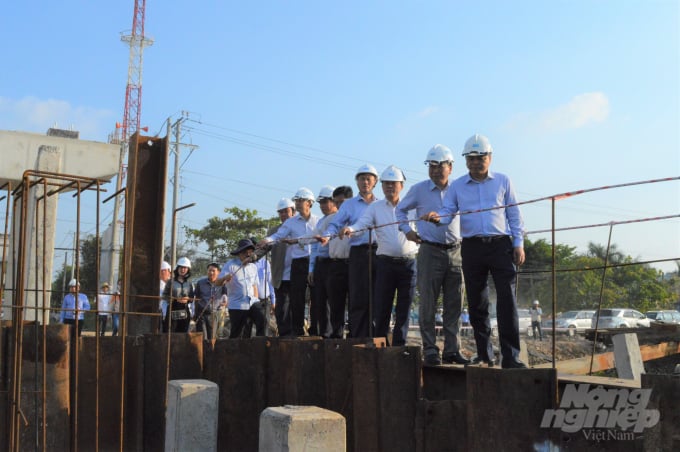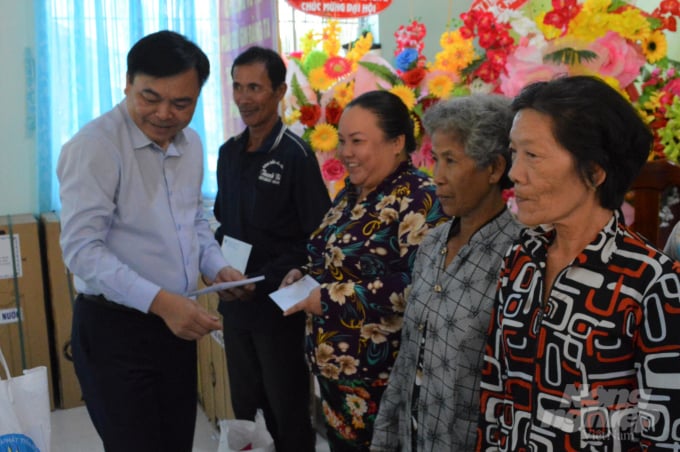May 29, 2025 | 04:47 GMT +7
May 29, 2025 | 04:47 GMT +7
Hotline: 0913.378.918
May 29, 2025 | 04:47 GMT +7
Hotline: 0913.378.918
That was the direction of Deputy Minister of Agriculture and Rural Development Nguyen Hoang Hiep at a working session held on January 15 to inspect the prevention of salinity and drought, overcoming their consequences and building agricultural works in the southern Kien Giang Province.

Inspecting Cai Be sluice project, Deputy Minister of Agriculture and Rural Development Nguyen Hoang Hiep requests to speed up the construction progress so that by February, the project will be put into operation and promote the effectiveness right from the beginning of the dry season. Photo: Trung Chanh.
During the working session, the ministerial delegation inspected the operation of Kenh Nhanh sluice gate (Rach Gia City)-the newly completed project put into use to help close the estuaries in Rach Gia City which discharge water to the West Sea. Thanks to the new project, Kien Giang has been proactive in providing fresh water to the province's water plant supplying clean water for citizens in Rach Gia and the neighboring districts. At the same time, the project helps protect rice production from salinity in key districts such as Tan Hiep and Hon Dat.

Deputy Minister of Agriculture and Rural Development Nguyen Hoang Hiep inspects the operation of Kenh Nhanh sluice. The project has just been completed and put into use to help close the estuaries in Rach Gia City. Photo: Trung Chanh.
While inspecting the construction of Cai Be sewer, the Deputy Minister asked construction units to speed up the progress so that by mid-February they will close the gate, ensuring effective prevention of salinity from the beginning of the dry season. For Cai Lon sewer, the contractor needs to mobilize the best engineers and experts in installing the mechanical parts of the project ensuring accuracy and soon putting them into operation from May.
Reporting to the delegation, Mr. Nguyen Huynh Trung, Director of Kien Giang Irrigation Sub-Department said that saltwater has been penetrating tens of kilometers deep into some rivers in the province. Specifically, on the Lon River, the salinity of 4.0g/l has penetrated 33km deep, while in Go Quao District, the 1.0g/l salinity has entered 44km. Similarly, on Cai Be River, the saline intrusion of 4.0g/l and 1.0g/l has affected through 16km in Chau Thanh District and 27km in Giong Rieng District respectively.

The delegation inspects the construction site of Xeo Ro sewer on Xeo Ro canal which helps Kien Giang to close the coastal dyke of An Bien - An Minh. Photo: Trung Chanh.
The province has set up a plan to build 340 dams to temporarily prevent seasonal salinity, with a financial source of about VND 160 billion. However, if Cai Be sluice gate can operate early in February, it will help reduce the operation of about 160 temporary dams, mainly in Giong Rieng District. In addition, U Minh Thuong District has installed eight large-capacity pumps to help store and provide fresh water for irrigating in more than 13,000 hectares of forests and agricultural land.
Kien Giang also proposed the Government, ministries and central agencies soon support funding of more than VND163 billion among the total of over VND521 billion that it needs to proactively cope with the risk of drought, water shortage, salinity intrusion in dry season 2020-2021. The remaining sum will be mobilized by the province itself from other sources.

The Deputy Minister presents gifts to farmers who were affected by natural disasters of drought and saline in An Bien District. Photo: Trung Chanh.
The Deputy Minister highly appreciated the authorization of Kien Giang Province with measures effectively implemented over recent times to prevent and combat salinity. Typically, the building of temporary dams to efficiently protect agricultural production has become good examples for other localities to follow.

The delegation visits and donates the drinking water filter directly to two communes and some schools in An Bien District. Photo: Trung Chanh.
In addition, the conversion of crops to avoid drought has been quite successful, helping Kien Giang pass a year of fruitful successes with bumper harvests. Its agriculture output has exceeded the scheduled plan while farmers enjoyed high prices of products and a good income.
On this occasion, the delegation visited and gave gifts to farmers in An Bien District which had been affected by natural disasters, drought and saline, and encouraged them to settle down soon.
The Deputy Minister asked related units to complete the temporary operation of the project right in this January, so that when the Cai Be sluice gate was closed, the project could operate immediately and promote efficiency. He also urged a similarity to the operation of Cai Lon so that to ensure the effectiveness in preventing saline and drought right in the dry season this year and to make Cai Lon - Cai Be irrigation system to become a symbol of efficiency of public investment and a typical project of exceeding construction progress.
Compared with the scheduled time assigned by the Ministry of Agriculture and Rural Development, the work has exceeded 4 months. it has also exceeded 10 months over its whole plan.
Translated by Kim Khuyen
/2025/05/25/4127-3-073637_820.jpg)
(VAN) Thanks to the promotion from an FAO-implemented project, vegetable production in greenhouses in Moc Chau has seen strong development, from 1.5 hectares in 2021 to nearly 50 hectares in 2024.

(VAN) FAO has recently supported USD 140,000 to implement the project 'Risk mitigation human-animal interface risks through disease control initiatives in pig farming.'

(VAN) The People's Committee of Tra Vinh province has approved an adjustment to the investment policy for the Green Hydrogen Plant project, increasing its area to approximately 52.76 hectares.
![Reducing emissions from rice fields: [2] Farmers’ commitment to the soil](https://t.ex-cdn.com/nongnghiepmoitruong.vn/608w/files/news/2025/05/05/dsc08881jpg-nongnghiep-140632.jpg)
(VAN) Clean rice cultivation model in Thuong Tan commune, Bac Tan Uyen district, is assisting local residents in achieving sustainable agriculture by substantially reducing costs, increasing productivity, and protecting the environment.

(VAN) At the conference to disseminate Resolution No. 68, AgriS introduced its digital agricultural ecosystem and reaffirmed its commitment to accompanying the Government in promoting private sector development and sustainable agriculture.

(VAN) 'Blue Ocean - Blue Foods' initiative is designed to restore marine ecosystems and establish sustainable livelihoods for local communities by cultivating a minimum of 1,000 hectares of cottonii seaweed in the first three years.
/2025/05/21/4642-3-112707_603.jpg)
(VAN) The V-SCOPE project has made direct contributions to three out of six pillars of the Comprehensive Strategic Partnership between Vietnam and Australia.